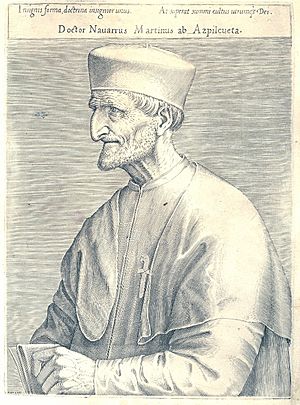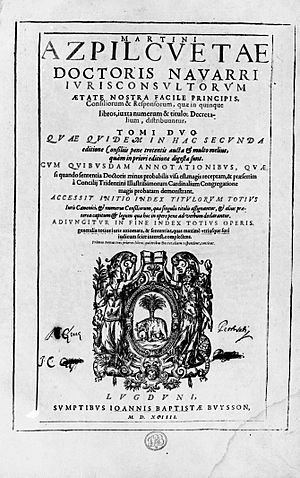Martín de Azpilcueta facts for kids
Quick facts for kids
Martín de Azpilcueta
|
|
|---|---|

|
|
| Born | 13 December 1491 Barásoain, Kingdom of Navarre, Crown of Castille
|
| Died | 1 June 1586 |
| Era | Renaissance philosophy |
| Region | Western philosophy
|
| School | Thomism School of Salamanca |
|
Main interests
|
|
|
Notable ideas
|
Quantity theory of money |
Martín de Azpilcueta (also known as Azpilkueta in Basque) was an important Spanish thinker. He was born on December 13, 1491, and passed away on June 1, 1586. People also called him Doctor Navarrus.
He was a famous canonist, meaning he studied church law. He was also a theologian, someone who studies religious ideas. Azpilcueta was one of the first people to think deeply about economics. In 1556, he developed an important idea called the quantity theory of money.
Contents
The Life of Martín de Azpilcueta
Martín de Azpilcueta was born in a place called Barásoain, in the Kingdom of Navarre. He was related to a famous missionary named Francis Xavier.
Early Education and Teaching
Azpilcueta first studied theology at Alcalá University. In 1518, he earned a special degree in canon law from Toulouse in France.
Starting in 1524, Azpilcueta taught church law at the University of Salamanca. From 1538 to 1556, he taught at Coimbra University in Portugal. The kings of Portugal and Spain invited him to teach there.
Later Years in Rome
When he was 80 years old, Azpilcueta traveled to Rome. He went there to help his friend, Bartolomé Carranza. Carranza was the Archbishop of Toledo and was facing charges.
Even though Azpilcueta could not clear his friend, he was highly respected in Rome. Several popes honored him greatly. People saw him as a very wise and knowledgeable person. He was known for being humble, fair, and kind to others.
Azpilcueta passed away in Rome when he was 94 years old. He is buried in the Church of San Antonio de' Portoghesi. His nephew wrote a book about his life.
Important Writings and Ideas
One of Azpilcueta's most famous books was Manual de confesores y penitentes. He wrote it in 1549. This book was very important for church law and ethics. By the early 1600s, it had been printed 81 times.
Developing Moral Theology
The Manual helped create moral theology as its own field of study. Azpilcueta added four extra parts to his Manual. One of these parts talked about exchange, supply and demand, and money. This part was later translated into English as On Exchange in 2014.
In this work, Azpilcueta said that using money for trade was natural. This was different from what Aristotle had believed. He thought money was like any other product. He also said that whether an exchange was fair depended on the trade itself, not on the money used.
Views on Church Income
Azpilcueta also wrote about how church leaders should use their money. His work was first published in Spanish in 1566. It was later translated into Latin in 1568. He believed that church leaders should only use their income for their own needs and to help the poor.
Supporting Local Languages
During the Counter-Reformation, the Catholic Church mostly used Latin in its services. However, Azpilcueta supported using local languages. In 1545, he released his Commento en Romance in Coimbra.
In this book, he wrote prayers like Our Father and Hail Mary in both Latin and Castilian. This went against those who wanted to keep only Latin. Later, he explained that local languages had been used before. He mentioned a "pious and knowledgeable Cantabrian" who used Basque for prayers. Azpilcueta felt that using Latin made it harder for people in rural areas to understand Christian teachings.
Other Works
Azpilcueta wrote many other books. These included topics like the Breviary (a prayer book), church property, and the jubilee year. A full collection of his works was printed in Rome in 1590.
The Idea of Time Value of Money
Some people believe that Azpilcueta was the first to think about the time value of money. This is the idea that money available now is worth more than the same amount of money in the future. This is because money can earn interest or be invested.
See also
 In Spanish: Martín de Azpilcueta para niños
In Spanish: Martín de Azpilcueta para niños
- Doctrine of mental reservation
- Equivocation
- Tomás de Mercado, another "Iberian monetarist"
- Pedro Agerre Azpilikueta, Basque prominent writer and maternal relative
 | John T. Biggers |
 | Thomas Blackshear |
 | Mark Bradford |
 | Beverly Buchanan |


